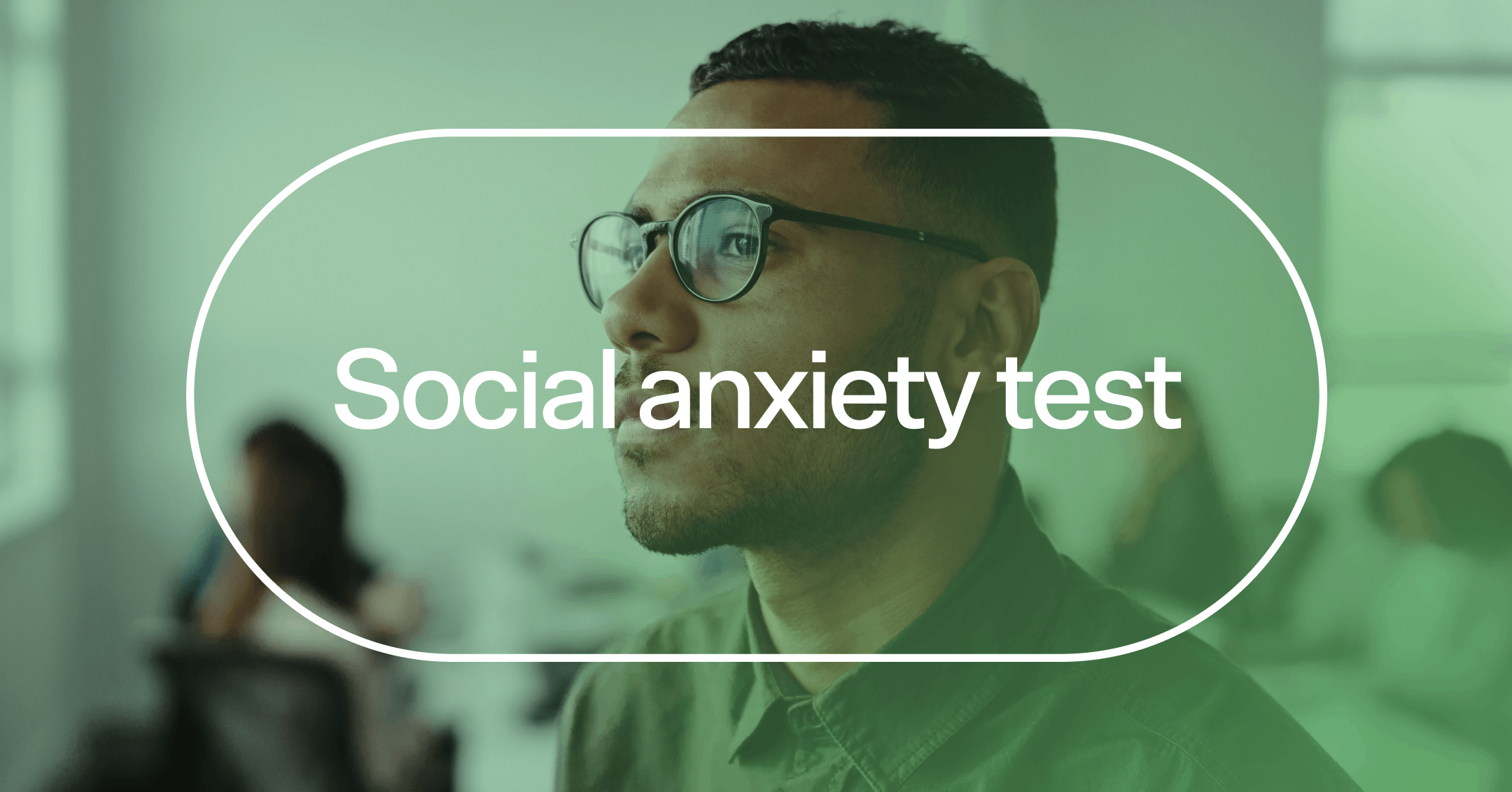This brief social anxiety disorder quiz can help you better understand your behavior and thoughts around social interactions.
Social anxiety disorder involves an intense fear or avoidance of social interactions.
Only a qualified mental health professional can provide a social anxiety disorder diagnosis, but learning more about your symptoms is a great first step toward getting the care you deserve.
Social anxiety disorder (SAD) — also known as social phobia — is a mental health condition that occurs when people are intensely afraid of social interactions or avoid them all together. If this sounds like you, we have a free social anxiety test you can take to learn more about your symptoms.
If you have social anxiety disorder, you may fear that others will judge you during everyday encounters. This can cause extreme distress during day-to-day interactions and might even motivate you to avoid interactions when possible. For example, you may wait until you get home from school to have lunch so no one can watch you eat. Or you may feel like you’re under a microscope in the workplace.
People with SAD may also experience panic attacks while socializing or when they feel like the focus is on them, like when public speaking. They might also have extreme anxiety in anticipation of events that involve socializing, like going to a dinner party, being in the public eye, or asking for help while at the grocery store.
Self-test for social anxiety disorder
Our brief quiz can help you gain more insight on your behavior in social settings. Know that a quiz can’t diagnose you with a mental health condition. Only a qualified mental health practitioner can. But by learning more about your symptoms, you can better equip yourself to seek out the right care.
Read the following questions, and choose the answer that best describes you.*
Do you find yourself generally fearful of social settings?
Never
Sometimes
Always
Do you tend to worry that other people will judge you for your words or actions?
Never
Sometimes
Always
Do you tend to have these worries in all social situations?
Never
Sometimes
Always
Do you tend to avoid social situations?
Never
Sometimes
Always
Do others seem more comfortable socially than you do?
Never
Sometimes
Always
Do you want to be more comfortable in social settings?
Never
Sometimes
Always
*_Quiz content written by Lolly Coleman, MS, LMFT._
The care you need, when you need it
Learn how Rula can support your mental health journey
How can you use this quiz to advocate for yourself?
If you answered “sometimes” or “always” to most or all of these questions, and these symptoms are causing you distress in your everyday life, it’s a good idea to set up an appointment to discuss these in greater depth with a healthcare provider.
This quiz can be a powerful tool to advocate for yourself when seeking care from a mental health professional. In addition to sharing experiences with your doctor or therapist about your social anxiety, you can also offer your quiz results.
If you aren’t diagnosed with social anxiety, it’s also possible that these symptoms could stem from a different mental health condition. For example, many of the symptoms of social anxiety can also be caused by obsessive-compulsive disorder (OCD).
It’s also possible that you’re just a naturally shy person. Though, this doesn’t mean that shyness isn’t uncomfortable or intense even if it isn’t as disruptive as social phobia. Shyness is a strong risk factor for the development of social anxiety disorder, so it’s important to keep tabs on how often and severely you experience anxiety in social situations.
The bottom line is that any symptoms causing you distress or getting in the way of you enjoying and living your life to the fullest are worthy of being discussed with a mental healthcare provider.
How can social anxiety disorder affect your life?
Living with social anxiety disorder can be challenging. Social phobia can disrupt your personal and professional relationships and negatively affect your regular routine. You may relate with these experiences if you’re part of the 7% of U.S. adults with social anxiety disorder.
In addition to these obstacles, conditions like depression, alcohol use disorder, and bipolar disorder are also more common in people with social anxiety disorder. People living with SAD and a co-occurring condition are more likely to experience worse symptoms, treatment resistance, and have higher rates of suicide* than those with just SAD.
*The 988 Suicide and Crisis Lifeline provides 24/7, confidential support with trained crisis counselors. If you or a loved one is in emotional distress or a suicidal crisis, please call or text 988. If you’re experiencing a life-threatening emergency or you need immediate help, please call 911.
Many of my clients wonder whether their social anxiety (or another mental health concern) ‘counts.’ They’re asking if it’s bad enough to address it. To this, I will always say, ‘You deserve care for any symptom that’s keeping you from meeting your goals or fully thriving in life.

Elise Miller, MA, LPC
Clinical reviewer
Find care with Rula
Most people know what it’s like to feel anxious in social situations or in anticipation of them. But if your social anxiety severely disrupts your life, you might have social anxiety disorder. Our quiz can be the first step on the journey to getting the right kind of care to support your needs.
At Rula, we’re committed to delivering a comprehensive behavioral health experience that helps people feel seen and understood so they can get back to feeling their best.
Rula makes it easier to find a licensed therapist or psychiatric provider who accepts your insurance so you don’t have to choose between affordable care and excellent care. With a diverse network of more than 15,000 providers, 24/7 crisis support, and appointments available as soon as tomorrow, we’re here to help you make progress — wherever you are on your mental health journey.
Rula's editorial process
Rula's editorial team is on a mission to make science-backed mental health insights accessible and practical for every person seeking to better understand or improve mental wellness.
Members of Rula’s clinical leadership team and other expert providers contribute to all published content, offering guidance on themes and insights based on their firsthand experience in the field. Every piece of content is thoroughly reviewed by a clinician before publishing.




